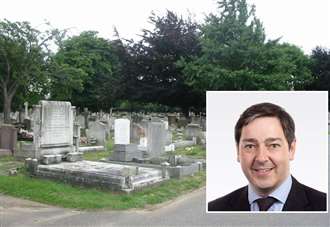Politics
Church Court Denies Widow’s Request to Rebury War Hero Husband

A church court has informed Evelyne Le Chêne that she cannot proceed with her wish to rebury her husband, Lieutenant Pierre Louis Le Chêne, in France. The couple’s story is one of both love and sacrifice, as Lieutenant Le Chêne was a highly decorated war hero who served valiantly during the Second World War. His remains currently rest in Gravesend and Milton Cemetery, but Mrs. Le Chêne desires to relocate them to Jaillans in the Drôme region, approximately 510 miles away.
In her petition, Mrs. Le Chêne expressed a heartfelt wish to fulfill a promise made to her husband before his passing: to be together for eternity. She indicated that moving his remains to the reserved plot in Jaillans would reunite him with family members laid to rest in the area. Her husband’s legacy includes surviving the notorious Mauthausen concentration camp and receiving the prestigious Légion d’honneur, awarded by General Charles de Gaulle.
The couple lived in Gravesend, where Lieutenant Le Chêne was interred after his death in 1979. Mrs. Le Chêne stated that French organizations are prepared to honor her husband upon his arrival in France, planning a significant ceremony for his reinterment.
Despite her intentions, the church court, specifically the Consistory Court of the diocese of Rochester, has denied her petitions on two occasions—first in April and again in July. The Diocesan Chancellor, David Willink, a barrister with expertise in canon law, explained that allowing the exhumation would undermine the principle of permanence associated with burial. He remarked, “It would be quintessentially to treat Captain Le Chêne’s remains as portable.”
The court noted that the exceptional status of Lieutenant Le Chêne as a non-French officer of high military rank did not constitute sufficient grounds for exhumation. While the court’s decision stands, it does not prevent Mrs. Le Chêne from being interred alongside her husband in Gravesend if she chooses.
Lieutenant Le Chêne served as a wireless operator with the Special Operations Executive until his capture by Nazi forces in late 1942. He endured severe interrogation and torture at the hands of Klaus Barbie, the Gestapo chief in Lyon, before ultimately being sent to Mauthausen. Remarkably, he survived to see the camp liberated by American forces in May 1945.
Throughout his life, Lieutenant Le Chêne was recognized for his bravery and dedication, earning numerous accolades. His contributions to the war effort remain a testament to his character and sacrifice. As Mrs. Le Chêne continues to seek a way to honor her husband’s memory, her story highlights the complex intersection of love, loss, and the legalities surrounding burial practices.
-

 Health1 month ago
Health1 month agoFiona Phillips’ Husband Shares Heartfelt Update on Her Alzheimer’s Journey
-

 World1 month ago
World1 month agoCole Palmer’s Cryptic Message to Kobbie Mainoo Following Loan Talks
-

 Entertainment3 months ago
Entertainment3 months agoLove Island Star Toni Laite’s Mother Expresses Disappointment Over Coupling Decision
-

 Health1 month ago
Health1 month agoNeurologist Warns Excessive Use of Supplements Can Harm Brain
-

 Entertainment2 months ago
Entertainment2 months agoMajor Cast Changes at Coronation Street: Exits and Returns in 2025
-

 World2 weeks ago
World2 weeks agoMassive Sinkhole Opens in Bangkok, Swallowing Cars and Causing Chaos
-

 Entertainment2 months ago
Entertainment2 months agoMasterChef Faces Turmoil as Tom Kerridge Withdraws from Hosting Deal
-

 World3 weeks ago
World3 weeks agoMichelle Tsiakkas Opens Up About Jamie Borthwick Before BBC Exit
-

 Lifestyle2 months ago
Lifestyle2 months agoEngland Flags Spark Controversy This Summer: A Cultural Debate
-

 Entertainment3 months ago
Entertainment3 months agoWoman Transforms Life with Boot Camp, Losing Nearly 9 Pounds in a Week
-

 World1 month ago
World1 month agoCoronation Street’s Asha Alahan Faces Heartbreaking Assault
-

 Entertainment3 months ago
Entertainment3 months agoColeen Nolan Reflects on Family Tragedy and Reconciliation









